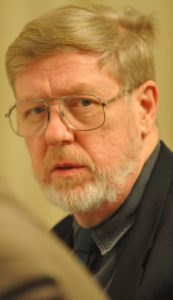
November 19, 2017
So, I’ll Run; Doing Good; Beggars
Poetry by Patrick T. Reardon
So, I’ll Run
’ll be well on my way, walking
home the long city streets seven
miles from downtown in a white
anger when the short, wide, thick,
lumpish, oddly handsome weight-lifter
of a man will be standing there, as I
round the building corner, a long
knife in his left hand and, on his
head, a backward baseball cap. He’ll
lock his eyes on mine, and, in his own
anger, clearly state unintelligible
syllables that I will know as a threat.
And, so, I’ll run off the sidewalk and
into the street, taking in the blooded
victim behind the knife man and the
sounds of sirens nearing and the knife
man standing in his stance, staring at
me and stabbing the blade into his
thigh again and again and again. I’ll
feel in my own thigh the blade of
each entry as the phantom pain
electrics up my spine, and I’ll close
my eyes and see the empty white
extending in all directions, formless
and vast and eternally ignorant of me.
Doing Good
Yes, here I am at
your grave, Adelaide,
in the full green of
summer grass in
Calvary Cemetery,
but it does you no
good, does it? dead
for three years after
your ninety-nine,
frail in the end ones
and a slow-spasming
body on your pure
hospital death bed
when, if alert, you
would have felt such
shame for me to see
your infant need and
mouth. A mile north,
downtown streets are
blocked in Evanston
for unaimed strolls
for chit and chat on
offer under tents
promising relief from
he pounding rays of
the clicking clock as
the voice of the stage
singer, first up, alone,
before two lanes of
bare tables and chairs,
a melody in the wild. I
feel duty to visit the
barber Ben nearing
ninety-eight, but the
weight chafes like the
corduroys I wore, poor-
sized, handed me, that
sang a shameful tune as
I walked the high school
corridor with a volcanoed
face and stiffly spined
before the ever eyes of
stone. Adelaide, you saw
your father, aged when
you were born before my
begetters, a kind of
perfect. You and I know
he was matted, chipped,
leaky, scuffed, pocked,
and empty as are we all.
He looked into your eyes.
I will stand again at State
and Madison in his honor
and yours although
it will do you no good, will it?
who have nothing for me as
I have nothing for you. Do I?
Beggars
Remember
the beggars.
Helen, waiting underground at the
foot of the stairs for the train-goers,
handsome but worn, pretty once in
a sun-swept grass-thick backyard,
now staccato with health sagas, slyly
asking the name of each with quarters
or a dollar for her and, on other days,
remembering. It is hard to ignore
someone who knows your name.
In Burger King, the beard guy with the
bike with bags filled with bags, bags,
bags, bags, bags, a single orange juice
in front of him his claim to the table and,
forehead-down on the Formica, he snoring,
dreaming of lifting the garbage lid in the
alley behind the Diner. The minimum-
wage kid cleans the floor around him.
Northbound lanes on Clark Street at Ridge
Avenue, the guy with the limp and the bad
eye, a toll booth, clothes too big, skin bad,
working each clumping of cars and trucks,
collecting coins in a plastic Coke cup, liking
the sound of the coin chaos rattling into the
cup even though the paper has more worth.
St. Helen of the Subway, pray for us.
St. Bicycle-man, pray for us.
St. Limper, pray for us.
The babuska'd angel, she of the tender smile
and gentle word, asks for prayers. Her water-
thickened fragile husband fell down the stairs,
her once-bear of steel and hug of caress is coma’d
n a hospital bed, and she remembers the ballet
she, young, took him, young, to and he liked it.
I am full of grace
and sorrow, and
I beg forgiveness
and forbearance —
can you see me? —
and my tears fall
for them and for
her and for him
and for my self-
dead brother and
for me, and for our
tight-coiled mother,
she of fear, and
our flat face father,
without words,
even for himself.
Viva la vida.

Write City Ezine is currently closed to submissions. See submission guidelines for further information.
Affiliates/Partners
Testimonials
Contact
Join CWA
Member Profile
My Account
Writers Conference
Presenters
Agents and Publishers
Pitch Sessions
Sponsors
Scholarships
Speaker Registration
Book of the Year
Spirit Award
First Chapter Contest
Resources
Home
Chicago Writers Association
info@chicagowrites.org
Make a Difference!

